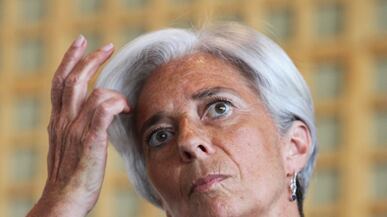International Monetary Fund chief Dominique Strauss-Kahn's ignominious downfall was more than a personal call to account. When Strauss-Kahn was arrested on charges of trying to rape a New York hotel maid May 14, by ricochet the IMF itself came in for closer scrutiny. Suddenly, the spotlight shined on an aggressively sexist workplace culture, a sort of chauvinist pig sty outside the reach of U.S. law in the heart of Washington. The supreme irony is that, increasingly, Strauss-Kahn's successor as IMF managing director looks set to be a woman. Indeed, clear frontrunner Christine Lagarde is the only woman even mooted to join the race for the fund's top job. But that is not all she's got going for her.
The annual G-8 meeting of world economic powers that met in Deauville last week was supposed to be something of a swan song for Strauss-Kahn the IMF chief and a coming-out party for Strauss-Kahn the presidential candidate. Many expected him to use the big-power powwow in his native France to steal President Nicolas Sarkozy's thunder, ahead of a 2012 run for Sarkozy's job. As it happens, after a surreal two weeks that sent France and the IMF reeling, Strauss-Kahn is under house arrest in swanky TriBeCa, his slick New York lawyers taking rhetorical cracks at the Guinean chambermaid he is alleged to have tried to rape. And the new star of the G-8 summit, the woman whose name was on everyone's lips, wasn't even invited to the head-of-state affair. Christine Lagarde, the elegant French finance minister, was packing for Brazil and her global campaign for DSK's job.
The absent star of the summit grew up 10 miles away in Le Havre, on the Normandy coast. From the sand of tony Deauville's beach, in the shadow of its glamorous casino, Le Havre's industrial port is a mass of glinting metal across the bay. Lagarde still keeps a house in the Normandy countryside and, unfailingly polite, will engage a reporter on the roses and rhododendrons she raises there sooner than end an answer on an abrupt “no comment.” In her fledgling campaign for the IMF leadership, she could have played the “Bad DSK” card to set herself apart from her defrocked countryman, but she has tended to pay tribute to his record at the IMF.
While Sarkozy has long been dubbed “l'Américain,” the term is much more fitting for Lagarde.

In Brasilia on Monday, she promised to pursue his reformist agenda if she is chosen for the job, pledging to make the institution more representative of smaller members. Silver-maned and an athletic 5'11”, Lagarde, 55, exudes a sort of heady classiness that had opposition Socialist leaders applauding her candidacy until the party remembered its ideological differences and declined to endorse her. Indeed, the passing references to the latest forensics on Strauss-Kahn's sperm make for a particularly jarring non sequitur in the coverage of Lagarde's IMF campaign. When Sarkozy was asked at the G-8 whether there was any risk Lagarde's candidacy would repeat the “casting error” he made backing Strauss-Kahn, he called his cabinet minister “a woman of great quality, whose personality is fairly predictable,” a subtle snub to the ousted economist.
In Paris last week, Lagarde was among guests of a dinner hosted by Hillary Clinton. While world leaders were meeting in Deauville, the U.S. secretary of state told French television that she “ admires” Lagarde. Careful not to be seen providing the United States' official support—which will be decisive for any candidate—Clinton did give Lagarde her own thumbs-up. “Speaking unofficially and personally, I am a strong supporter of qualified women, which she is certainly one, being given the opportunity to lead international organizations,” Clinton said.
Behind the scenes at the G-8, diplomats stressed the IMF leadership question was not once discussed in official roundtables, a move to appease emerging powers increasingly reluctant to leave key decisions to the old boys' club and give yet another European carte blanche for the IMF post. The top emerging powers, known collectively as the BRICs for Brazil, Russia, India, and China, are key targets for Lagarde's IMF charm offensive. Sarkozy told reporters in Deauville, “It isn't for the G-8 to decide on a nominee for managing director of the IMF. It would be shocking if that were the case. The G-8 is not the board of directors of the world.”
Still, Lagarde did come up in bilateral meetings, Sarkozy conceded, with President Obama for one. “I am not Mr. Obama's spokesman and it isn't for me to announce his decision,” Sarkozy said Friday, repeating how “particularly awkward” it would be for the G-8 to be seen agreeing on a single nominee. But, smiling, he appeared to land a big hint. “I saw the excellent declaration Mrs. Clinton made last night. I would have trouble imagining that there is disagreement between the two of them [Clinton and Obama].”
Yet question marks remain. French authorities are looking into the so-called Tapie Affair, an arbitration saga that ended abruptly when Lagarde declined to appeal a €285 million settlement payment to a businessman close to Sarkozy. French authorities are contemplating an official inquiry into claims she may have abused her authority in the case. Lagarde says her conscience is clear and that she won't withdraw her name from the IMF race even if an inquiry is called, but a formal investigation could last years and the IMF may want to remain above the legal fray.
Unlike Strauss-Kahn, Lagarde is not an economist by training. She made her mark as a labor and antitrust lawyer. (She was chair of the massive American firm Baker & McKenzie by the age of 43.) But the crisis did give her an invaluable crash course. Lagarde is credited with deftly handling negotiations that brought the European banking system back from the brink of collapse as the financial crisis took hold in 2008. She also played a key role in putting together a bailout mechanism for struggling euro-zone countries in 2010. Lagarde biographers Cyrille Lachèvre and Marie Visot relate a rumor about Dominique Strauss-Kahn joking that, if he was elected president in 2012, beating Sarkozy, he would pick Lagarde as his finance minister, too.
Yet Lagarde's personal economic bent isn't quite a matter of public record. She has handled France's economic policy at Sarkozy's behest for four years (she has only been in government for six). Along the way, she has quieted her own economic views, seeing through Sarkozy's pragmatic (some would say opportunistic, others bipolar) economic line as he has traveled the spectrum between free-market liberal and classic dirigiste. Lagarde's most unusual fun fact—that she was a national synchronized-swimming champ as a teenager—is often used as easy shorthand for her willingness to fall in line for the team. Lachèvre and Visot note that she pushed through Sarkozy economic policies even when she felt they were more statist than she would have liked.
Indeed, while Sarkozy has long been dubbed “ l'Américain,” the term is much more fitting for Lagarde. She finished high school in the United States, leaving Le Havre at 17 for Holton Arms School in Bethesda, Maryland, in 1973. She interned for William Cohen, a Republican congressman (and much later defense secretary under Bill Clinton), answering letters from his French-speaking constituents in Maine about Watergate. At Baker & McKenzie, Lagarde was for years based in Chicago. She forfeited a top-flight pension and left a reported million-dollar salary behind on a few hours' notice when she was offered a French cabinet post in 2005. But friends she made in Chicago would make Lagarde a huge asset for Europe through the financial crisis—think Timothy Geithner and Hank Paulson (whom she refers to as Tim and, despite her near-perfect English, “Honk”). Her biographers claim hers was the only French call Treasury Secretary Paulson would take on the day the decision was made to save a teetering AIG. And he rang her back that evening to apologize for cutting the call short.
We will know more about where she stands in the coming weeks, as Lagarde comes into her own jetting between capitals pleading her case. After a reportedly promising first trip, to Brazil on Monday, she will travel to India and China next week to woo more BRICs. Strauss-Kahn famously logged more than 60,000 miles (100,000 kilometers) selling his suitability to IMF members in 2007. This time, he won't be leaving the house.
Tracy McNicoll is Newsweek's Paris Correspondent. She has been covering Western Europe for the magazine since 2002.






